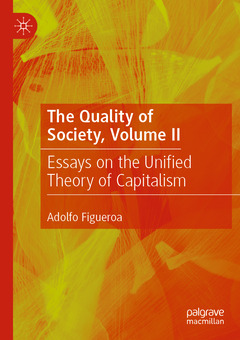The Quality of Society, Volume II, 1st ed. 2021 Essays on the Unified Theory of Capitalism
Auteur : Figueroa Adolfo

Preface
Acknowledgements
Contents
1. Introduction To Unified Theory Of Capitalism
Foundations And Findings
Unified Theory Of Capitalism Vs Prevailing Economic Theories
References
2. Scientific Economic Laws Of Capitalism
Science Is Epistemology
Beta-Propositions As Economic Laws
Equilibrium Laws
Causality Laws
Internalizing Physics And Biology Into Economic Process
The Nature Of Scientific Laws In Economics
Unified Theory Of Capitalism Vs Standard Economics
The Engineering Of Economics
Conclusions
References
3. European Colonialism And Capitalist Development
The Old World And The New World
A Brief History Of European Colonialism
Colonialism And The Capitalist Divide
Some Regional Differences
The Collapse Of European Colonialism
Conclusions
References
4. Hobsbawm’s Question On Peasantry
Andean Peasant Economy: The Geographical And Social Context
Peasant Farming Vs Capitalist Farming In The Andean Highlands
A Static Sigma Model Of The Andean Peasant Economy
A Dynamic Model
An Evolutionary Model: From Peasant To Wage Labor
From Peasant To Part-Time Peasant
The Effect Of Climate Change
The Effect Of Growth In Illegal Activities
Answering Hobsbawm and Amending The Standard Theories
References
5. On Economic Behavior of Workers
Standard Theories of Consumer Behavior
Human Drives in Workers Behavior
A Static Model
A Dynamic Model
Confronting Predictions with Facts
Conclusions
References
6. Market Prices In The Anthropocene Age
Markets Under Neoclassical Theory
Pricing of Exhaustible Natural Resources: Its Refutation
Pricing of Exhaustible Natural Resources under Unified Theory of Capitalism
Extraction Costs vs Degradation Costs
Markets Under Unified Theory of Capitalism
Market System as Institution of Capitalism
Conclusions
References
7. Inequality, Power Relations, And Democracy
Unified Theory of Capitalism: How It Explains The Real World
Economic Growth as Evolutionary Process
Why Inequality Under Capitalism is Not Self-Regulating
The Global Capitalist System as a Sigma Society
Theory and Facts Confrontations
Lessons from History
Conclusions
Appendix: Income Inequality is Higher in Sigma than in Epsilon Societies
References
8. Toughest Challenge Of Economics: Human Society Isn’t Immortal
Risks of Human Society Collapse
Economic Growth Process is Evolutionary, Not Mechanical
Economic Growth in The Global Capitalist System
A Collapse Model of Unified Theory
Deriving New Public Policies
Technological Innovations
Endosomatic vs Exosomatic Ways of Life
Meta-Policies to Change Public Policies
Workers Democracy: Its Requirements
Covid-19 Pandemic as First Warning of Collapse
Conclusions
References
List of Tables
Author Index
Countries Index
Subjetc Index
Presents a more historical companion volume to the author's larger project
Explains the persistence of inequality both within countries and between them
Highlights how capitalism depletes natural resources and pollutes the natural environment
Date de parution : 09-2022
Ouvrage de 230 p.
14.8x21 cm
Disponible chez l'éditeur (délai d'approvisionnement : 15 jours).
Prix indicatif 116,04 €
Ajouter au panierDate de parution : 09-2021
Ouvrage de 230 p.
14.8x21 cm
Disponible chez l'éditeur (délai d'approvisionnement : 15 jours).
Prix indicatif 116,04 €
Ajouter au panier


